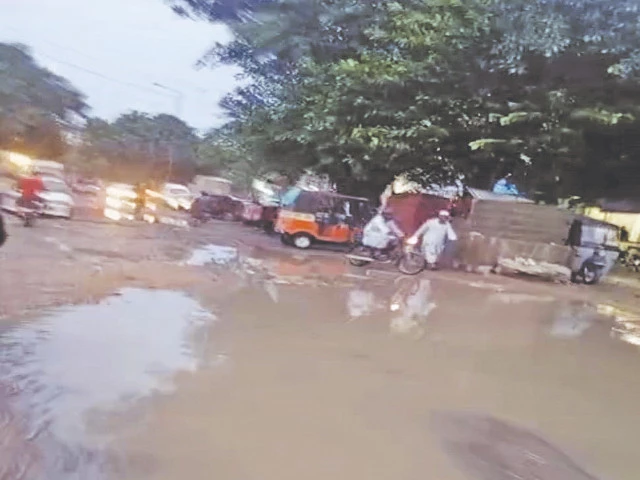Karachi:
The situation in several neighborhoods of the metropolis, particularly Gulshan-E-Iqbal, has deteriorated alarmingly after the rain spell of August 19, with residents who face immense difficulties in the midst of overflowing wastewater, broken roads and an apparent lack of response from municipal authorities.
According to the reports, several blocks of Gulshan-E-iqbal, including 13-d/2 and 13-d/3, have been the most affected. The streets remain flooded with stagnant wastewater water, while roads have developed dangerous cracks and potholes, which makes them almost impassable for both pedestrians and vehicles.
In block 13-d/2, near the land of the city, both main roads are submerged in wastewater. Residents say that the situation has gone worse, with damaged roads that make the daily trip a nightmare. The presence of Rickshaws illegally parked on trails has been added even more to chaos, creating serious obstacles to pedestrians trying to navigate the flooded area.
Similarly, in block 13-D/3, near the Nauman complex, citizens report that even motorcycles and cars are fighting to pass. The roads are broken, slippery and full of dirt. Walking, residents claim, is no longer an option.
“The streets are no longer recognizable. This is not just an inconvenience, it is a danger to health,” said a local resident, frustrated by the lack of visible efforts of the authorities to remedy the situation.
In addition to public anger is the absence of local municipal officials. In the neighborhood of the Phatak railroad, the accumulation of wastewater has not only caused serious traffic interruptions, but also has generated concerns about water transmitted diseases. Despite the repeated attempts, citizens have not been able to establish contact with elected representatives.
The President of the Council of the Union and the president of the city of Gulshan-E-Iqbal, Dr. Fawad, both affiliated with Jamaat-E-Islami, have remained unattainable, with their phones off.
The locals say they feel abandoned by those who were chosen to serve them. “They come by votes but disappear when it comes to action,” said another resident, standing up to the ankle in wastewater outside his home.
As residents begin to move from the blocks of worse blow, the silence and inaction of the authorities raise serious questions about disaster preparation and governance in the largest metropolis in the country.
Despite being a recurring problem in each monsoon, drainage and road infrastructure of the city are still very neglected. Without an official view in view, citizens must use themselves once again, paying the price for administrative apathy and political indifference.




